Garage floors are very likely to get dirty. Garages host all the vehicles and bikes of a house. The mass and dirty tires of vehicles are the reason behind poor condition of many garages.
Since garage floors are regularly under stress, they require maintenance. But what if there is an easy way to change the flooring every time it gets bad? Well, everyone will love it, won’t they?
Interlocking garage tiles are simple way to cover you dirty garage floor with beautiful tiles. These tiles basically come in two forms with respect to their composition: plastic and rubber-like interlocking tiles. As the name suggests, these tiles use a self-locking system for proper installation.
You can make any pattern you like out of these tiles. Also, these tiles are fairly sturdy and durable. And the best part is, you can install them on your own.
Interlocking garage floor tiles are a best way to fix your dirty floor. Interlocking tiles are cheap, convenient, durable, and beautiful. They come in two major categories. You can use any of them to make your garage look neat again.

Two Common Types of Interlocking Garage Floor Tiles
Interlocking garage floor tiles come in two varieties. These two types are purely with respect to the material of the tiles. These two types are:
1. Hard Plastic Tiles
Hard plastic interlocking garage floor tiles are made up of polypropylene. Polypropylene is a type of thermoplastic. Some manufacturers add some rubber too for increased mechanical properties.
As a standard, these tiles come in a square shape. However, when it comes to size, hard plastic garage interlocking tiles come in different dimensions with 12”×12”, 13”×13”, and 18”×18” the most common dimensions. The tiles also have a standard depth/thickness of 1/2”.
Hard tiles are UV resistant and do not fade their color. Currently, there are over 13 colors to choose from the list of available hard tiles. These tiles come in standard diamond, levant, and dot patterns.
When it comes to the shape, hard tiles come in two varieties.
- Perforated Hard Tiles
These tiles have gaps on their surface. These holes help in heat and air exchange. These holes also add to the aesthetics of the tile. But it is also difficult to clean this type of hard tiles. Also, these tiles get dirty very easily.
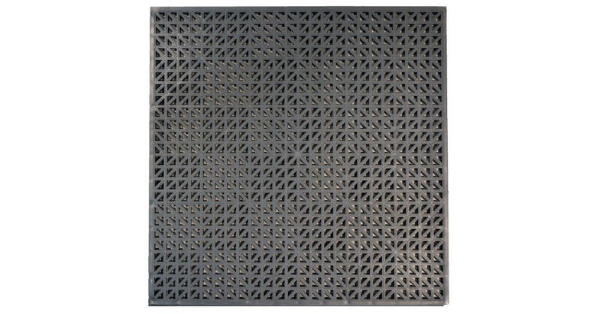
- Solid Hard Tiles
Solid tiles do not have any holes on their surface. Their surface is one block. These tiles completely isolate the garage floor from the external environment. Lack of patterns make these tiles a little less attractive. Solid surface also makes them very low maintenance.
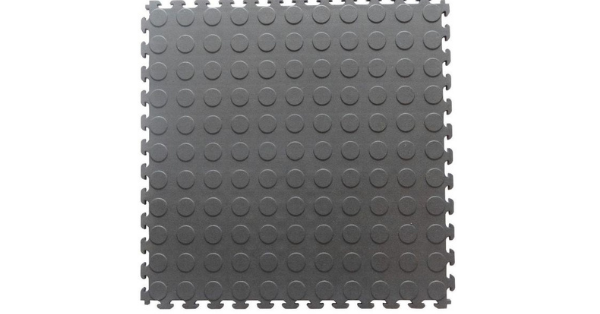
Flexible Plastic Tiles
Flexible plastic garage tiles are made up of polyvinyl chloride (PVC). Apart from PVC, these tiles also have plasticizers. These tiles are soft and resemble rubber in texture. In fact, they are softer than synthetic rubber. Due to this reason, rubber tiles is also a common misnomer for these tiles.
These tiles come in different dimensions depending upon the manufacturer. 12”x12” and 24”x24” are two common market sizes. These tiles are relatively less thick than hard tiles. Standard thickness is either one fourth of an inch.
Flexible plastic tiles are expensive than hard tiles. They use the jigsaw locking technology. This technology is not known for having a good seal. However, some manufacturers have started providing the straight seam system that is more water resistant. These tiles have less surface patterns available than the hard tils.
Just as hard tiles, the two types of flexible plastic tiles with respect to shape are:
- Perforated Soft Tiles
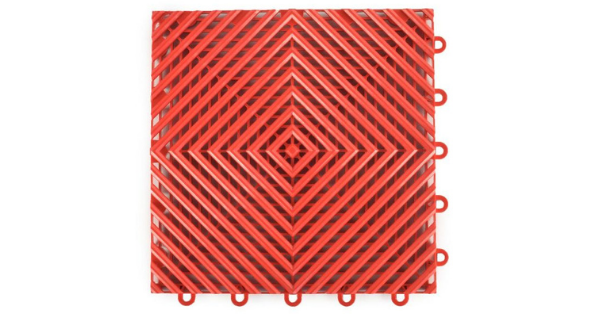
- Solid Soft Tile
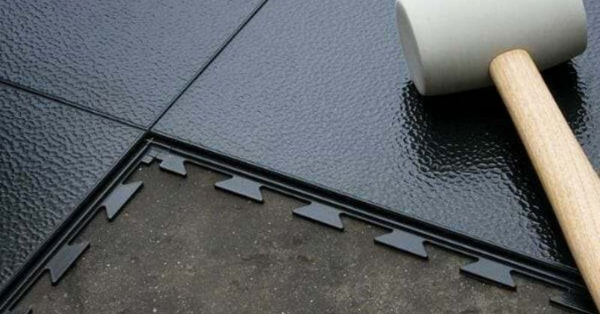
Interlocking Tiles Are the Best
Soft and hard tiles are different in their chemical composition. But they share some common points. These common points make them the best option for covering the garage floor. Interlocking tiles, regardless of their shape and type, share the following features some of which you will love!
They Are Cheap
Although soft plastic garage tiles cost 10% more than hard tiles, they are still cheaper than conventional tiles. Moreover, there is little to no setup cost involved as you can do self-installation.
On an average, plastic garage tiles are 30% less expensive than conventional ceramic tiles.
In addition to this, these tiles not fragile. This factor also drastically cut downs the transportation cost.
They Are Convenient
Easy transportation, ability to self-install, and cheaper rates collectively make plastic tiles a convenient option. Without a doubt, there is little to no hassle associated with these tiles.
During installation, weird edges can make the installation process a bit difficult. But this is not specific to these tiles. This is valid for any tile type.
They are Durable
Both hard and soft plastic garage tiles are durable. While soft tiles on an average have more life than hard tiles, collectively these products are as much durable as any other conventional tile.
Low price and increased durability have already made them favorite garage tile options in much of Europe and the US.
You Can Install Them Using DIY
One of the selling points that attracts me the most personally is the DIY ability. These tiles are super easy and fun to place. You would love doing this.
The only tools you will be needing are measuring tape, a metal ruler, a rubber mallet, and a knife. By having these tools and a simple plan, you can easily change the floor of your garage.
Interlocking Tiles Look Good
Last but not the least, plastic tiles are beautiful. They typically come in diamond, dot, and levant patterns. On top of that, they also come in perforated and solid shapes. Moreover, there is a wide variety of color that is available in the market.
By using any of the size, shape, and color you can make custom tile patterns that everyone will love!
Conclusion
Interlocking garage tiles are a great invention. They are super easy and fun to install. They are cheaper than ordinary tiles. They look beautiful and they are durable. All these features make them a best suit for covering your dirty garage floor.
If you are interested in buying some, here is where you can get interlocking tiles:
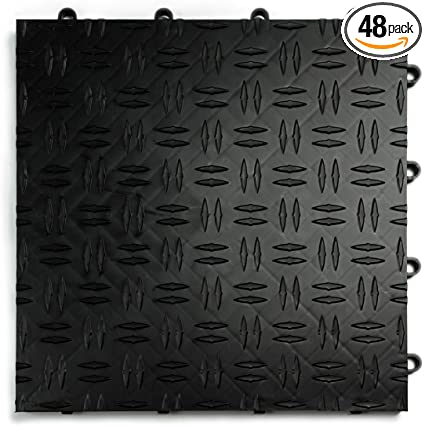
GarageTrac Diamond, Durable Interlocking Modular Garage Flooring Tile
Black Interlocking Garage Floor Tile
[amazon fields=”B0753THQM6″ value=”button”]
